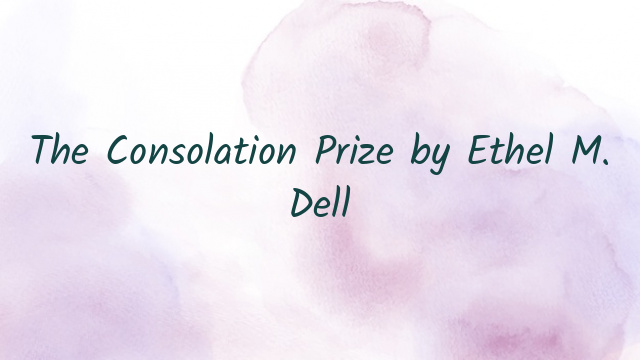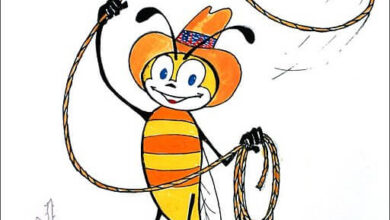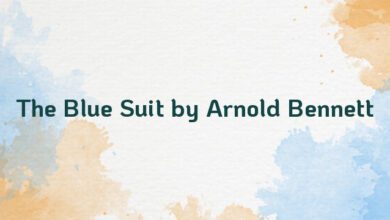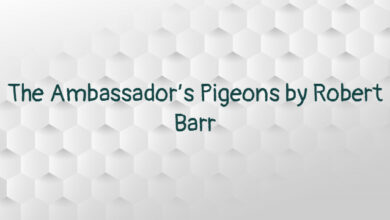
The Consolation Prize by Ethel M. Dell
“So you don’t want to marry me?” said Earl Wyverton.
He said it by no means bitterly. There was even the suggestion of a smile on his clean-shaven face. He looked down at the girl who stood before him, with eyes that were faintly quizzical. She was bending at the moment to cut a tall Madonna lily from a sheaf that grew close to the path. At his quiet words she started and the flower fell.
He stooped and picked it up, considered it for a moment, then slipped it into the basket that was slung on her arm.
“Don’t be agitated,” he said, gently. “You needn’t take me seriously–unless you wish.”
She turned a face of piteous entreaty towards him. She was trembling uncontrollably. “Oh, please, Lord Wyverton,” she said, earnestly, “please, don’t ask me! Don’t ask me! I–I felt so sure you wouldn’t.”
“Did you?” he said. “Why?”
He looked at her with grave interest. He was a straight, well-made man; but his kindest friends could not have called him anything but ugly, and there were a good many who thought him formidable also. Nevertheless, there was that about him–an honesty and a strength–which made up to a very large extent for his lack of other attractions.
“Tell me why,” he said.
“Oh, because you are so far above me,” the girl said, with an effort. “You must remember that. You can’t help it. I have always known that you were not in earnest.”
“Have you?” said Lord Wyverton, smiling a little. “Have you? You seem to have rather a high opinion of me, Miss Neville.”
She turned back to her flowers. “There are certain things,” she said, in a low voice, “that one can’t help knowing.”
“And one of them is that Lord Wyverton is too fond of larking to be considered seriously at any time?” he questioned.
She did not answer. He stood and watched her speculatively.
“And so you won’t have anything to say to me?” he said at last. “In fact, you don’t like me?”
She glanced at him with grey eyes that seemed to plead for mercy. “Yes, I like you,” she said, slowly. “But–“
“Never mind the ‘but,'” said Wyverton, quietly. “Will you marry me?”
She turned fully round again and faced him. He saw that she was very pale.
“Do you mean it?” she said. “Do you?”
He frowned at her, though his eyes remained quizzical and kindly. “Don’t be frightened,” he said. “Yes; I am actually in earnest. I want you.”
She stiffened at the words and grew paler still; but she said nothing.
It was Wyverton who broke the silence. There was something about her that made him uneasy.
“You can send me away at once,” he said, “if you don’t want me. You needn’t mind my feelings, you know.”
“Send you away!” she said. “I!”
He gave her a sudden, keen look, and held out his hand to her. “Never mind the rest of the world, Phyllis,” he said, very gravely. “Let them say what they like, dear. If we want each other, there is no power on earth that can divide us.”
She drew in her breath sharply as she laid her hand in his.
“And now,” he said, “give me your answer. Will you marry me?”
He felt her hand move convulsively in his own. She was trembling still.
He bent towards her, gently drawing her. “It is ‘Yes,’ Phyllis,” he whispered. “It must be ‘Yes.'”
And after a moment, falteringly, through white lips, she answered him.
“It is–‘Yes.'”
“And you accepted him! Oh, Phyllis!”
The younger sister looked at her with eyes of wide astonishment, almost of reproach. They were two of a family of ten; a country clergyman’s family that had for its support something under three hundred pounds a year. Phyllis, the eldest girl, worked for her living as a private secretary and had only lately returned home for a brief holiday.
Lord Wyverton, who had seen her once or twice in town, had actually followed her thither to pursue his courtship. She had not believed herself to be the attraction. She had persistently refused to believe him to be in earnest until that afternoon, when the unbelievable thing had actually happened and he had definitely asked her to be his wife. Even then, sitting alone with her sister in the bedroom they shared, she could scarcely bring herself to realize what had happened to her.
“Yes,” she said; “I accepted him of course–of course. My dear Molly, how could I refuse?”
Molly made no reply, but her silence was somehow tragic.
“Think of mother,” the elder girl went on, “and the children. How could I possibly refuse–even if I wanted?”
“Yes,” said Molly; “I see. But I quite thought you were in love with Jim Freeman.”
In the silence that followed this blunt speech she turned to look searchingly at her sister. Molly was just twenty, and she did the entire work of the household with sturdy goodwill. She possessed beauty that was unusual. They were a good-looking family, and she was the fairest of them all. Her eyes were dark and very shrewd, under their straight black brows; her face was delicate in colouring and outline; her hair was red-gold and abundant. Moreover, she was clever in a strictly practical sense. She enjoyed life in spite of straitened circumstances. And she possessed a serenity of temperament that no amount of adversity ever seemed to ruffle.
Having obtained the desired glimpse of her sister’s face, she returned without comment to the very worn stocking that she was repairing.
“I had a talk with Jim Freeman the other day,” she said. “He was driving the old doctor’s dog-cart and going to see a patient. He offered me a lift.”
“Oh!” Phyllis’s tone was carefully devoid of interest. She also took up a stocking from the pile at her sister’s elbow and began to work.
“I asked him how he was getting on,” Molly continued. “He said that Dr. Finsbury was awfully good to him, and treated him almost like a son. He asked very particularly after you; and when I told him you were coming home he said that he should try and manage to come over and see you. But he is evidently beginning to be rather important, and he can’t get away very easily. He asked a good many questions about you, and wanted to know if I thought you were happy and well.”
“I see.” Again the absence of interest in Phyllis’s tone was so marked as to be almost unnatural.
Molly dismissed the subject with a far better executed air of indifference.
“And you are really going to marry Earl Wyverton,” she said. “How nice, Phyl! Did he make love to you?”
There was a distinct pause before Phyllis replied. “No. There was no need.”
“He didn’t!” ejaculated Molly.
“I didn’t encourage him to,” Phyllis confessed. “He went away directly after. He said he should come to-morrow and see dad.”
“I suppose he’s frightfully rich?” said Molly, reflectively.
“Enormously, I believe.” A deep red flush rose in Phyllis’s face. She had begun to tremble again in spite of herself. Molly suddenly dropped her work and leaned forward.
“Phyl, Phyl,” she said, softly; “shall I tell you what Jim Freeman said to me that day? He said that very soon he should be able to support a wife–and I knew quite well what he meant. I told him I was glad–so glad. Oh, Phyl, darling, when he comes and asks you to go to him, what will you say?”
Phyllis looked up with quick protest on her lips. She wrung her hands together with a despairing gesture.
“Molly, Molly,” she gasped, “don’t torture me! How can I help it? How can I help it? I shall have to send him away.”
“Oh, poor darling!” Molly said. “Poor, poor darling!”
And she gathered her sister into her arms, pressing her close to her heart with a passionate fondness of which only a few knew her to be capable. There was only a year between them, and Molly had always been the leading spirit, protector and comforter by turns.
Even as she soothed and hushed Phyllis into calmness her quick brain was at work upon the situation. There must be a way of escape somewhere. Of that she was convinced. There always was a way of escape. But for the time at least it baffled her. Her own acquaintance with Wyverton was very slight. She wished ardently that she knew what manner of man he was at heart.
Upon one point at least she was firmly determined. This monstrous sacrifice must not take place, even were it to ensure the whole family welfare. The life they lived was desperately difficult, but Phyllis must not be allowed to ruin her own life’s happiness and another’s also to ease the burden.
But what a pity it seemed! What a pity! Why in wonder was Fate so perverse? Molly thought. Such a brilliant chance offered to herself would have turned the whole world into a gilded dreamland. For she was wholly heart-free.
The idea was a fascinating one. It held her fancy strongly. She began to wonder if he cared very deeply for her sister, or if mere looks had attracted him.
She had good looks too, she reflected. And she was quick to learn, adaptable. The thought rushed through her mind like a meteor through space. He might be willing. He might be kind. He had a look about his eyes–a quizzical look–that certainly suggested possibilities. But dare she put it to the test? Dare she actually interfere in the matter?
For the first time in all her vigorous young life Molly found her courage at so low an ebb that she was by no means sure that she could rely upon it to carry her through.
She spent the rest of that day in trying to screw herself up to what she privately termed “the necessary pitch of impudence.”
At nine o’clock on the following morning Lord Wyverton, sitting at breakfast alone in the little coffee-room of the Red Lion, heard a voice he recognized speak his name in the passage outside.
“Lord Wyverton,” it said, “is he down?”
Lord Wyverton rose and went to the door. He met the landlady just entering with a basket of eggs in her hand. She dropped him a curtsy.
“It’s Miss Molly from the Vicarage, my lord,” she said.
Molly herself stood in the background. Behind the landlady’s broad back she also executed a village bob.
“I had to come with the eggs. We supply Mrs. Richards with eggs. And it seemed unneighbourly to go away without seeing your lordship,” she said.
She looked at him with wonderful dark eyes that met his own with unreserved directness. He told himself as he shook hands that this girl was a great beauty and would be a magnificent woman some day.
“I am pleased to see you,” he said, with quiet courtesy. “It was kind of you to look me up. Will you come into the garden?”
“I haven’t much time to spare,” said Molly. “It’s my cake morning. You are coming round to the Vicarage, aren’t you? Can’t we walk together?”
“Certainly,” he replied at once, “if you think I shall not be too early a visitor.”
Molly’s lips parted in a little smile. “We begin our day at six,” she said.
“What energy!” he commented. “I am only energetic when I am on a holiday.”
“You’re on business now, then?” queried Molly.
He looked at her keenly as they passed out upon the sunlit road. “I think you know what my business is,” he said.
She did not respond. “I’ll take you through the fields,” she said. “It’s a short cut. Don’t you want to smoke?”
There was something in her manner that struck him as not altogether natural. He pondered over it as he lighted a cigarette.
“They are cutting the grass in the church fields,” said Molly. “Don’t you hear?”
Through the slumberous summer air came the whir of the machine. It was June.
“It’s the laziest sound on earth,” said Wyverton.
Molly turned off the road to a stile. “You ought to take a holiday,” she said, as she mounted it.
He vaulted the railing beside it and gave her his hand. “I’m not altogether a drone, Miss Neville,” he said.
Molly seated herself on the top bar and surveyed him. “Of course not,” she said. “You are here on business, aren’t you?”
Wyverton’s extended hand fell to his side. “Now what is it you want to say to me?” he asked her, quietly.
Molly’s hands were clasped in her lap. They did not tremble, but they gripped one another rather tightly.
“I want to say a good many things,” she said, after a moment.
Lord Wyverton smiled suddenly. He had meeting brows, but his smile was reassuring.
“Yes?” he said. “About your sister?”
“Partly,” said Molly. She put up an impatient hand and removed her hat. Her hair shone gloriously in the sunlight that fell chequered through the overarching trees.
“I want to talk to you seriously, Lord Wyverton,” she said.
“I am quite serious,” he assured her.
There followed a brief silence. Molly’s eyes travelled beyond him and rested upon the plodding horses in the hay-field.
“I have heard,” she said at length, “that men and women in your position don’t always marry for love.”
Wyverton’s brows drew together into a single, hard, uncompromising line. “I suppose there are such people to be found in every class,” he said.
Molly’s eyes returned from the hay-field and met his look steadily. “I like you best when you don’t frown,” she said. “I am not trying to insult you.”
His brows relaxed, but he did not smile. “I am sure of that,” he said, courteously. “Please continue.”
Molly leaned slightly forward. “I think one should be honest at all times,” she said, “at whatever cost. Lord Wyverton, Phyllis isn’t in love with you at all. She cares for Jim Freeman, the doctor’s assistant–an awfully nice boy; and he cares for her. But, you see, you are rich, and we are so frightfully poor; and mother is often ill, chiefly because there isn’t enough to provide her with what she needs. And so Phyllis felt it would be almost wicked to refuse your offer. Perhaps you won’t understand, but I hope you will try. If it weren’t for Jim, I would never have told you. As it is–I have been wondering–“
She broke off abruptly and suddenly covered her face with her two hands in a stillness so tense that the man beside her marvelled.
He moved close to her. He was rather pale, but by no means discomposed.
“Yes?” he said. “Go on, please. I want you to finish.”
There was authority in his voice, but Molly sat in unbroken silence.
He waited for several moments, then laid a perfectly steady hand on her knee.
“You have been wondering–” he said.
She did not raise her head. As if under compulsion, she answered him with her face still hidden.
“I have dared to wonder if–perhaps–you would take me–instead. I–am not in love with anybody else, and I never would be. If you are in love with Phyllis, I won’t go on. But if it is just beauty you care for, I am no worse-looking than she is. And I should do my best to please you.”
The low voice sank. Molly’s habitual self-possession had wholly deserted her at this critical moment. She was painfully conscious of the quiet hand on her knee. It seemed to press upon her with a weight that was almost intolerable.
The silence that followed was terrible to her. She wondered afterwards how she sat through it.
Then at last he moved and took her by the wrists. “Will you look at me?” he said.
His voice sent a quiver through her. She had never felt so desperately scared and ashamed in all her healthy young life. Yet she yielded to the insistence of his touch and tone, and met the searching scrutiny of his eyes with all her courage. He was not angry, she saw; nor was he contemptuous. More than that she could not read. She lowered her eyes and waited. Her pulses throbbed wildly, but still she kept herself from trembling.
“Is this a definite offer?” he asked at last.
“Yes,” she answered. Her voice was very low, but it was steady.
He waited a second, and she felt the mastery of the eyes she could not meet.
“Forgive me,” he said, then; “but are you actually in earnest?”
“Yes,” she said again, and marvelled at her own daring.
His hold tightened upon her wrists. “You are a very brave girl,” he said.
There was a baffling note in his tone, and she glanced up involuntarily. To her intense relief she saw the quizzical, kindly look in his eyes again.
“Will you allow me to say,” he said, “that I don’t think you were created for a consolation prize?”
He spoke somewhat grimly, but his tone was not without humour. Molly sat quite still in his hold. She had a feeling that she had grossly insulted him, that she had made it his right to treat her exactly as he chose.
After a moment he set her quietly free.
“I see you are serious,” he said. “If you weren’t–it would be intolerable. But do you actually expect me to take you at your word?”
She did not hesitate. “I wish you to,” she said.
“You think you would be happy with me?” he pursued. “You know, I am called eccentric by a good many.”
“You are eccentric,” said Molly, “or you wouldn’t dream of marrying one of us. As to being happy, it isn’t my nature to be miserable. I don’t want to be a countess, but I do want to help my people. That in itself would make me happy.”
“Thank you for telling me the truth,” Wyverton said, gravely. “I believe I have suspected some of it from the first. And now listen. I asked your sister to marry me–because I wanted her. But I will spoil no woman’s life. I will take nothing that does not belong to me. I shall set her free.”
He paused. Molly was looking at him expectantly. His face softened a little under her eyes.
“As for you,” he said, “I don’t think you quite realize what you have offered me–how much of yourself. It is no little thing, Molly. It is all you have. A woman should not part with that lightly. Still, since you have offered it to me, I cannot and do not throw it aside. If you are of the same mind in six months from now, I shall take you at your word. But you ought to marry for love, child–you ought to marry for love.”
He held out his hand to her abruptly, and Molly, with a burning face, gave him both her own.
“I can’t think how I did it,” she said, in a low voice. “But I–I am not sorry.”
“Thank you,” said Lord Wyverton, and he stooped with an odd little smile, and kissed first one and then the other of the hands he held.
No one, save Phyllis, knew of the contract made on that golden morning in June on the edge of the flowering meadows; and even to Phyllis only the bare outlines of the interview were vouchsafed.
That she was free, and that Lord Wyverton felt no bitterness over his disappointment, he himself assured her. He uttered no word of reproach. He did not so much as hint that she had given him cause for complaint. He was absolutely composed, even friendly.
He barely mentioned her sister’s interference in the matter, and he said nothing whatsoever as to her singular method of dealing with the situation. It was Molly who briefly imparted this action of hers, and her manner of so doing did not invite criticism.
Thereafter she went back to her multitudinous duties without an apparent second thought, shouldering her burden with her usual serenity; and no one imagined for a moment what tumultuous hopes and doubts underlay her calm exterior.
Lord Wyverton left the place, and the general aspect of things returned to their usual placidity.
The announcement of the engagement of the vicar’s eldest daughter to Jim Freeman, the doctor’s assistant in the neighbouring town, created a small stir among the gossips. It was generally felt that, good fellow as young Freeman undoubtedly was, pretty Phyllis Neville might have done far better for herself. A rumour even found credence in some quarters that she had actually refused the wealthy aristocrat for Jim Freeman’s sake, but there were not many who held this belief. It implied a foolishness too sublime.
Discussion died down after Phyllis’s return to her work. It was understood that her marriage was to take place in the winter. Molly’s hands were, in consequence, very full, and she had obviously no time to talk of her sister’s choice. There was only one visitor who ever called at the Vicarage in anything approaching to state. Her visits usually occurred about twice a year, and possessed something of the nature of a Royal favour. This was Lady Caryl, the Lady of the Manor, in whose gift the living lay.
This lady had always shown a marked preference for the vicar’s second daughter.
“Mary Neville,” she would remark to her friends, “is severely handicapped by circumstance, but she will make her mark in spite of it. Her beauty is extraordinary, and I cannot believe that Providence has destined her for a farmer’s wife.”
It was on a foggy afternoon at the end of November that Lady Caryl’s carriage turned in at the Vicarage gates for the second state call of the year.
Molly received the visitor alone. Her mother was upstairs with a bronchial attack.
Lady Caryl, handsome, elderly, and aristocratic, entered the shabby drawing-room with her most gracious air. She sat and talked for a while upon various casual subjects. Molly poured out the tea and responded with her usual cheery directness. Lady Caryl did not awe her. Her father was wont to remark that Molly was impudent as a robin and brave as a lion.
After a slight pause in the conversation Lady Caryl turned from parish affairs with an abruptness somewhat characteristic of her, but by no means impetuous.
“Did you ever chance to meet Earl Wyverton, my dear Mary?” she inquired. “He spent a few days here in the summer.”
“Yes,” said Molly. “He came to see us several times.”
The beautiful colour rose slightly as she replied, but she looked straight at her questioner with a directness almost boyish.
“Ah!” said Lady Caryl. “I was away from the Manor at the time, or I should have asked him to stay there. I have always liked him.”
“We like him too,” said Molly, simply.
“He is a gentleman,” rejoined Lady Caryl, with emphasis. “And that makes his misfortune the more regrettable.”
“Misfortune!” echoed Molly.
She started a little as she uttered the word–so little that none but a very keen observer would have noticed it.
“Ah!” said Lady Caryl. “You have not heard, I see. I suppose you would not hear. But it has been the talk of the town. They say he has lost practically every penny he possessed over some gigantic American speculation, and that to keep his head above water he will have to sell or let every inch of land he owns. It is particularly to be regretted, as he has always taken his responsibilities seriously. Indeed, there are many who regard his principles as eccentrically fastidious. I am not of the number, my dear Mary. Like you, I have a high esteem for him, and he has my most heartfelt sympathy.”
She ceased to speak, and there was a little pause.
“How dreadful!” Molly said then. “It must be far worse to lose a lot of money than to be poor from the beginning.”
The flush had quite passed from her face. She even looked slightly pale.
Lady Caryl laid down her cup and rose. “That would be so, no doubt,” she said. “I think I shall try to persuade him to come to us at the end of the year. And your sister is to be married in January? It will be quite an event for you all. I am sure you are very busy–even more so than usual, my dear Mary.”
She made her stately adieu and swept away.
After her departure Molly bore the teacups to the kitchen and washed them with less than her usual cheery rapidity. And when the day’s work was done she sat for a long while in her icy bedroom, with the moonlight flooding all about her, thinking, thinking deeply.
It was the eve of Phyllis’s wedding-day, and Molly was hard at work in the kitchen. The children were all at home, but she had resolutely turned every one out of this, her own particular domain, that she might complete her gigantic task of preparation undisturbed. The whole household were in a state of seething excitement. There were guests in the house as well, and every room but the kitchen seemed crowded to its utmost capacity. Molly was busier than she had ever been in her life, and the whirl of work had nearly swept away even her serenity. She was very tired, too, though she was scarcely conscious of it. Her hands went from one task to another with almost mechanical skill.
She was bending over the stove, stirring a delicacy that required her minute attention when there came a knock on the kitchen door.
She did not even turn her head as she responded to it. “Go away!” she called. “I can’t talk to anyone.”
There was a pause–a speculative pause–during which Molly bent lower over her saucepan and concluded that the intruder had departed.
Then she became suddenly aware that the door had opened quietly and someone had entered. She could not turn her head at the moment.
“Oh, do go away!” she said. “I haven’t a second to spare; and if this goes wrong I shall be hours longer.”
The kitchen door closed promptly and obligingly, and Molly, with a little sigh of relief, concentrated her full attention once more upon the matter in hand.
The last critical phase of the operation arrived, and she lifted the saucepan from the fire and turned round with it to the table.
In that instant she saw that which so disturbed her equanimity that she nearly dropped saucepan and contents upon the kitchen floor.
Earl Wyverton was standing with his back against the door, watching her with eyes that shone quizzically under the meeting brows.
He came forward instantly, and actually took the saucepan out of her hands.
“Let me,” he said.
Molly let him, being for the moment powerless to do otherwise.
“Now,” he said, “what does one do–pour it into this glass thing? I see. Don’t watch me, please; I’m nervous.”
Molly uttered a curious little laugh that was not wholly steady.
“How did you come here?” she said.
He did not answer her till he had safely accomplished what he had undertaken. Then he set down the saucepan and looked at her.
“I am staying with Lady Caryl,” he told her gravely. “I arrived this afternoon. And I have come here to present a humble offering to your sister, and to make a suggestion equally humble to you. I arrived here in this room by means of a process called bribery and corruption. But if you are too busy to listen to me, I will wait.”
“I can listen,” Molly said.
He had not even shaken hands with her, and she felt strangely uncertain of herself. She was even conscious of a childish desire to run away.
He took her at her word at once. “Thank you,” he said. “Now, do you remember a certain conversation that took place between us six months ago?”
“I remember,” she said.
An odd sense of powerlessness had taken possession of her, and she knew it had become visible to him, for she saw his face alter.
“I know I’m ugly,” he said, abruptly; “but I’m not frowning, believe me.”
She understood the allusion and laughed rather faintly. “I’m not afraid of you, Lord Wyverton,” she said.
He smiled at her. “Thank you,” he said. “That’s kind. I’m coming to the point. There are just two questions I have to ask you, and I’ve done. First, have they told you that I’m a ruined man?”
Molly’s face became troubled. “Yes,” she said. “Lady Caryl told me. I was very sorry–for you.”
She uttered the last two words with a conscious effort. He was mastering her in some subtle fashion, drawing her by some means irresistible. She felt almost as if some occult force were at work upon her. He did not thank her for her sympathy. Without comment he passed on to his second question.
“And are you still disposed to be generous?” he asked her, with a directness that surpassed her own. “Is your offer–that splendid offer of yours–still open? Or have you changed your mind? You mustn’t pity me overmuch. I have enough to live on–enough for two”–he smiled again that pleasant, sudden smile of his–“if you will do the cooking and polish the front-door knob.”
“What will you do?” demanded Molly, with a new-found independence of tone that his light manner made possible.
“I shall clean the boots,” he answered, promptly, “or swab the floors, or, it may be”–he bent slightly towards her, and she saw a new light in his eyes as he ended–“it may be, stand by my wife to lift the saucepan off the fire, or do all her other little jobs when she is tired.”
Again, and more strongly, she felt that he was drawing her, and she knew that she was going–going into deep waters in which his hand alone could hold her up. She stood before him silently. Her heart was beating very fast. The surging of the deep sea was in her ears. It almost frightened her, though she knew she had no cause to fear.
And then, suddenly, his hands were upon her shoulders and his eyes were closely searching her face.
“I offer you myself, Molly,” he said, and there was ringing passion in his voice, though he controlled it. “I loved you from the moment you offered to marry me. Is not that enough?”
Yes; it was enough. The mastery of it rolled in upon her in a full flood-tide that no power of reasoning could withstand. She drew one long, gasping breath–and yielded. The splendour of that moment was greater than anything she had ever known. Its intensity was almost too vivid to be borne.
She stretched up her arms to him with a little sob of pure and glad surrender. There was no hiding what was in her heart. She revealed it to him without words, but fully, gloriously, convincingly, as she yielded her lips to his. And she forgot that she had desired to marry him for his money. She forgot that the family clothes were threadbare and the family cares almost impossible to cope with. She knew only that better thing which is greater than poverty or pain or death itself. And, knowing it, she possessed more than the whole world, and found it enough.
Late that night, when at last Molly lay down to rest with the morrow’s bride by her side, there came the final revelation of that amazing day. Neither she nor Wyverton had spoken a word to any of that which was between them. It was not their hour; or, rather, the time had not arrived for others to share in it.
But as the two girls clasped one another on that last night of companionship Phyllis presently spoke his name.
“I actually haven’t told you what Lord Wyverton did, Moll,” she said. “You would never guess. It was so unexpected, so overwhelming. You know he came to tea. You were busy and didn’t see him. Jim was there, too. He came straight up to me and said the kindest things to us both. We were standing away from the rest. And he put an envelope into my hand and asked me, with his funny smile, to accept it for an old friend’s sake. He disappeared mysteriously directly after. And–and–Molly, it was a cheque for a thousand pounds.”
“Good gracious!” said Molly, sharply.
“Wasn’t it simply amazing?” Phyllis continued. “It nearly took my breath away. And then Lady Caryl arrived, and I showed it to her. And she said that the story of his ruin was false, that she thought he himself had invented it for a special reason that had ceased to exist. And she said that she thought he was richer now than he had ever been before. Why, Molly, Molly–what has happened? What is it?”
Molly had suddenly sprung upright in bed. The moonlight was shining on her beautiful face, and she was smiling tremulously, while her eyes were wet with tears.
She reached out both her arms with a gesture that was full of an infinite tenderness.
“Yes,” she said, “yes, I see.” And her glad voice rang and quivered on that note which Love alone can strike. “It’s true, darling. It’s true. He is richer now than he ever was before, and I–I have found endless riches too. For I love him–I love him–I love him! And–he knows it!”
“Molly!” exclaimed her sister in amazement.
Molly did not turn. She was staring into the moonlight with eyes that saw.
“And nothing else counts in all the world,” she said. “He knows that too, as we all know it–we all know it–at the bottom of our hearts.”
And with that she laughed–the soft, sweet laugh of Love triumphant–and lay back again by her sister’s side.




